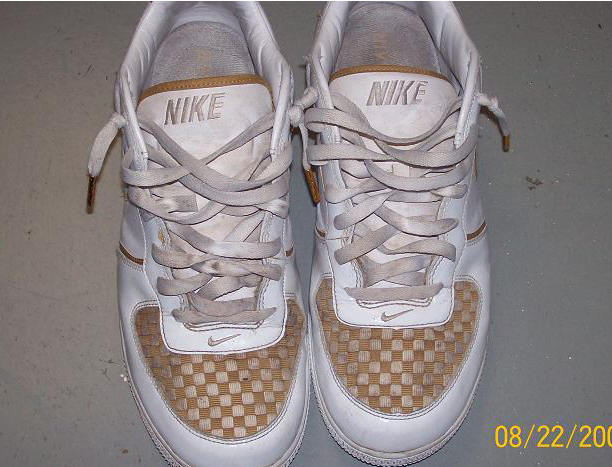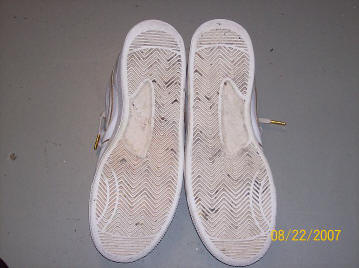(10/2) If deleted photos cost a
Thurmont Police officer his job, could
recovering the same or similar photos have
saved it?
The question is not as hypothetical as it
might seem. Though Lt. Shawn Tyler resigned
from the Thurmont Police Department in
February over photos he deleted related to an
internal investigation, an investigation by
The Dispatch has found that the photos may not
have been lost. Attorneys in the case with
which the photos were associated possessed
either the deleted photos or similar photos,
which the assistant states attorney on the
case said she believed were the same photos
and Tyler himself has identified as the “exact
same” photos he deleted.
The Dispatch’s investigation also shows two
big questions have yet to be answered by
involved parties: Why didn’t either the
assistant states attorney or the defense
attorney in the case show the photos that did
exist to Tyler during a hearing on the matter
and have him identify them as either similar
to or the ones he deleted? And, what would
have happened had the attorneys shown the
photos to the court?
Taking the photos
The deleted photos showed the shoes of Daniel
David Jenkins of Thurmont. Former Thurmont
Police Officer DiAnne Tackett arrested Jenkins
on assault charges on Aug. 18, 2007. To
Tackett, a pivotal point in charging Jenkins
with felony assault was whether or not there
was blood on Jenkins’ shoes. Tackett reported
that she saw no blood, and as a result,
charged Jenkins with a lesser degree of
assault.
The assault victim’s father complained to
Tyler, Tackett’s supervisor, that the charge
wasn’t severe enough. Tyler decided to review
the quality of Tackett’s work, her rationale
for the lesser charge and why she had failed
to prepare the case by a deadline Assistant
States Attorney Theresa Bean had said she
needed to meet. When Tackett explained that
she hadn’t seen blood on Jenkins’ shoes, Tyler
asked if she had taken photos. Learning she
hadn’t, Tyler had a corrections officer at the
county detention center take photos of
Jenkins’ shoes and e-mail them to Tyler.
The photos did not show blood on the shoes.
Tyler asked Tackett, who said she could
describe the shoes, to do so. She was unable.
Once the pictures had served Tyler’s purpose,
he deleted them from his computer, although it
was never determined whether the images
remained on the computer’s hard drive. During
the February 6, 2008 hearing to dismiss the
Jenkins case, because the photos had been
deleted, Tyler said he deleted them because “I
didn’t believe they had evidentiary value for
the purposes I had taken them.”
Bean thought otherwise. Shortly after Tyler
deleted the photos, Bean began inquiring about
the photos through a number of e-mails and
Tyler continued to tell Bean he had deleted
them, according to a copy of notes Tyler kept
at the time, which The Dispatch obtained from
a source familiar with the case. When
contacted, Tyler would not comment, but he did
confirm the notes were his.
When photos become evidence
 On August 29, 2007, Tackett filed a complaint
against Tyler for creating a hostile work
environment for her because of the internal
investigation. Though the charges were later
found “non-sustained,” the complaint led to
Tyler being disciplined by Thurmont Police
Chief Greg Eyler for deleting the photos
against a departmental general order. Thurmont
Police have a general order not to delete
evidence.
On August 29, 2007, Tackett filed a complaint
against Tyler for creating a hostile work
environment for her because of the internal
investigation. Though the charges were later
found “non-sustained,” the complaint led to
Tyler being disciplined by Thurmont Police
Chief Greg Eyler for deleting the photos
against a departmental general order. Thurmont
Police have a general order not to delete
evidence.
During the Feb. 6 hearing, Bean told the
court she had requested the evidence be
preserved, but her request was ignored.
However, according to e-mails exchanged at the
time between Bean and Tyler, by the time Bean
began requesting that the photos be preserved,
they had already been deleted, something which
according to the e-mails, Bean should have
already known.
 In the e-mails, Tyler told Bean at 9:30
a.m. on Aug. 30, 2007, “I don’t have pictures
of the shoes.”
In the e-mails, Tyler told Bean at 9:30
a.m. on Aug. 30, 2007, “I don’t have pictures
of the shoes.”
At 10:09 a.m. the same day, Bean e-mailed
Tyler back requesting the photos he had just
told Bean he didn’t have. “Let me be perfectly
clear, the photos you took of those shoes are
relevant and in my opinion, exculpatory and I
need them,” Bean’s e-mail reads. Furthermore,
she tells Tyler not to “destroy, alter or
delete the photos in any way.”
During the dismissal hearing, Jenkins’
attorney, Alan Winik, presented the e-mails
out of chronological order. As a result, it
appeared as if Tyler was refusing Bean’s
request, though the judge could have read the
date and time stamp. The Dispatch has no basis
to believe Winik was trying to mislead the
court.
In addition, Tyler’s notes indicate that
this was not the only e-mail exchange where he
told Bean the photos had already been deleted.
Retrieving the photos
When Winik learned of Tyler’s photo deletion
from Bean, he filed a motion to dismiss the
case. At the Feb. 6 hearing, Winik said that
because the photos had been deleted, his
client had been denied access to exculpatory
evidence. Neither Winik nor Bean reported at
the hearing that, in response to a discovery
motion for exculpatory evidence made by Winik
on October 23, 2007, Winik had received from
Bean a set of photos that were either
duplicates of or similar to the photos Tyler
had obtained of Jenkins’ shoes while Jenkins
was in the detention center. Bean’s response
was filed with the court, but not the photos
themselves.
When Tyler was called to the stand at the
hearing on Winik’s motion to dismiss, Winik
had Solt advise him of his rights. Winik then
criticized Tyler for deleting the photos. Bean
asked no follow up questions of Tyler, leaving
him unable to explain himself.
States Attorney Charlie Smith said Tyler
knew he wouldn’t be asked any questions in an
effort to minimize the damage Winik would try
to do. Tyler’s notes indicate he believed that
Bean would be asking him questions.
Neither Winik nor Bean explained to the
court that photos of the shoes, either
identical or similar to the Tyler photos, had
been recovered from the detention center
computer system and both attorneys had had
them for months. It is not clear whether the
photos recovered are the same as the deleted
ones, but Bean told The Dispatch she believed
they were. At the hearing, Winik only referred
to the Tyler photos, stating they had been
“destroyed willy nilly and [are] no longer
available.” Bean did not object to the comment
or produce the recovered photos.
In a February 20, 2008 e-mail from Bean to
Smith, which was part of an e-mail obtained
under a Freedom of Information Act request,
Bean wrote that she received pictures of the
shoes from Lt. Tim Selin, commander of
technology services with the Frederick County
Sheriff’s Office – Corrections Bureau, on
Sept. 4, 2007.
When asked why she did not disclose the
existence of the photos to the judge during
the hearing, Bean said, “We recovered three
pictures from the jail. They were of shoes,
but I can’t say they were the shoes, though I
assume they were.” When asked why she didn’t
ask Tackett (who described the shoes in detail
during the hearing) or Tyler if the shoes in
the recovered pictures were Jenkins’, Bean did
not explain. She referred further questions to
Smith.
The Dispatch obtained the photos under a
Freedom of Information request and showed them
to Tyler. He said of the pictures, “These
appear to be the exact same pictures I
received from the detention officer.”
Though the case wasn’t dismissed, Tyler was
severely criticized by both attorneys and the
court for deleting potential evidence that may
have favored the defendant. And the court
ruled that when the case went to trial, the
jury would be told of the deletion of the
photos and their potential value to Jenkins’
defense. Again, the recovered photos were not
mentioned.
Who knew the photos existed?
“Everybody knew they (the photos) existed,”
Smith said. “Shawn knew it. The judge knew it
because she had the discovery document in
front of her. Winik knew it because he got it
in discovery.”
Statements by Solt during the hearing
suggest otherwise. At one point in the
hearing, she noted that the pictures “existed”
and had “clear evidentiary value.” A short
time later, she said, “The deliberate nature
of the loss of this evidence is very
concerning to the court.” Solt never mentions
the recovered photos and The Dispatch has no
information suggesting Solt was aware of their
existence at the time of the hearing, despite
reference to them in the disclosure filing
previously copied to the court file.
Tyler’s notes also state that he didn’t
know of the existence of the recovered photos
until after he had resigned.
Smith said he considered the case
successful because Solt did not grant Winik’s
motion to dismiss the case and the state
ultimately secured a conviction. Still, the
case harmed Tyler’s reputation and his career.
Smith said that what happened following the
hearing was unfortunate. “I thought Shawn did
a good job,” Smith said. “He gave us a valid
explanation for why the photos were deleted.”
Tyler’s resignation
A media report of the hearing apparently led
to an unusual Saturday special session of the
Thurmont Town Commissioners in which they
voted to have Eyler “initiate an emergency
suspension, and investigation of a town
employee.” That employee was Tyler, who chose
to resign the following day.
Since that time, comments have slowly been
made public showing that at least some town
officials feel that Tyler didn’t receive
justice. Smith also has regrets.
“I think Shawn was a good officer and I
think the whole thing played out badly for
him,” Smith said.
So the questions the attorneys have not
answered still remain: Why weren’t the
recovered photos introduced at the hearing and
why, if not, did the states attorney office
not determine for certain whether the
recovered photos were the same as the deleted
photos or even if the photos were still on
Tyler’s computer hard drive.
And the question that will never be
answered is: What would have happened had the
court seen the recovered photos?
PHOTOCAPTION:
- Photos courtesy of Frederick County
Sheriff’s Office
Two of the photographs deleted by Lt. Shawn
Tyler, formerly of the Thurmont Police
Department. Attorneys had these photos,
recovered from the county detention center
computers, in their possession, but did not
present them during the hearing. The photos
were said to have been irretrievably lost and
Tyler eventually lost his job because of it.